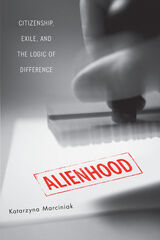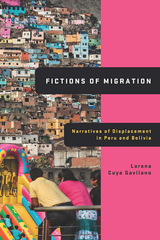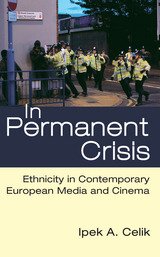Results by Title
3 books about Emigration and immigration in motion pictures
3 books about Emigration and immigration in motion pictures

Alienhood
Citizenship, Exile, And The Logic Of Difference
Katarzyna Marciniak
University of Minnesota Press, 2006
“Alien” has a double meaning in the United States, suggesting both “foreigner” and “extraterrestrial creature.” In Alienhood, Katarzyna Marciniak explores this semantic duality. Interrogating the dominant images of aliens in American popular culture—and in legal, historical, linguistic, and literary discourses—Marciniak examines “alienhood” and the impact it has on the daily experiences of migrants, legal or illegal.
Using examples from exilic literature and cinema, including the works of Julia Alvarez, Eva Hoffman, Gregory Nava, and Roman Polanski, Alienhood theorizes multicultural experiences of liminal characters that belong in the interstices between nations. Investigating gendered, racialized, and ideological formations of “aliens,” Marciniak’s readings put into dialogue narratives from both the second world and the third world in relation to “first worldness.” This dialogue problematizes the meanings of “transnational” and brings the so-called second world into these debates. In doing so, Marciniak reorients the study of immigrant or exile subjects beyond the celebrated notion of transnationalism.
With its unique focus on “aliens” in relation to discourses of immigration, exile, and displacement, Alienhood shows how transnationality is, for many dislocated people, an unattainable privilege.
Katarzyna Marciniak is associate professor of English at Ohio University.
Using examples from exilic literature and cinema, including the works of Julia Alvarez, Eva Hoffman, Gregory Nava, and Roman Polanski, Alienhood theorizes multicultural experiences of liminal characters that belong in the interstices between nations. Investigating gendered, racialized, and ideological formations of “aliens,” Marciniak’s readings put into dialogue narratives from both the second world and the third world in relation to “first worldness.” This dialogue problematizes the meanings of “transnational” and brings the so-called second world into these debates. In doing so, Marciniak reorients the study of immigrant or exile subjects beyond the celebrated notion of transnationalism.
With its unique focus on “aliens” in relation to discourses of immigration, exile, and displacement, Alienhood shows how transnationality is, for many dislocated people, an unattainable privilege.
Katarzyna Marciniak is associate professor of English at Ohio University.
[more]

Fictions of Migration
Narratives of Displacement in Peru and Bolivia
Lorena Cuya Gavilano
The Ohio State University Press, 2021
Lorena Cuya Gavilano’s Fictions of Migration: Narratives of Displacement in Peru and Bolivia is an aesthetic and cultural analysis of how political and economic trends have impacted narratives about migration in Peru and Bolivia in the late twentieth and early twenty-first centuries. Going beyond representations of migrants as subjects of crisis, Fictions of Migration approaches the migrant as a subject of knowledge, examining how narratives of migrancy in the Andes have become affective epistemological tools to learn about migrants’ experiences, cultural roots, and the mishaps of modernity that caused their displacement in the first place. Through the examination of films and novels—by such writers and filmmakers as José María Arguedas, Blanca Wiethüchter, Daniel Alarcón, Claudia Llosa, Jorge Sanjinés, Juan Carlos Valdivia, Jesús Urzagasti, and Paolo Agazzi, among others–Cuya Gavilano looks at the intersection of crisis, knowledge, and affect in order to piece together seemingly incompatible images of migrancy. She explores how dissimilar images of migration in two countries with a common ethnic and cultural history are the result of differentiated emotional and social responses to the adoption and adaptation of neoliberal economic agendas. Fictions of Migration thereby shows Andean stories of displacement can serve as distinctive models to understand multiethnic national spaces globally.
[more]

In Permanent Crisis
Ethnicity in Contemporary European Media and Cinema
Ipek A. Celik
University of Michigan Press, 2015
Refugees, migrants, and minorities of migrant origin frequently appear in European mainstream news in emergency situations: victims of human trafficking, suspects of terrorism, “bogus” asylum seekers. Through analysis of work by established filmmakers Michael Haneke, Fatih Akin, and Alfonso Cuarón, In Permanent Crisis contemplates the way mass media depictions become invoked by film to frame ethnic and racial Otherness in Europe as adornments of catastrophe. Special attention is given to European auteur films in which riots, terrorism, criminal activities, and honor killings bring Europe’s minorities to the forefront of public visibility only to reduce them to perpetrators or victims of violence.
[more]
READERS
Browse our collection.
PUBLISHERS
See BiblioVault's publisher services.
STUDENT SERVICES
Files for college accessibility offices.
UChicago Accessibility Resources
home | accessibility | search | about | contact us
BiblioVault ® 2001 - 2024
The University of Chicago Press









